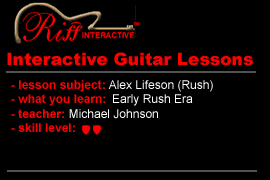Scroll through the lesson and click on notation/video/audio links to load the interactive players.
Please subscribe to get full access to all lessons for only $7.95/month PLUS 1 week free trial.

Riff Interactive lessons are
LESS expensive and
MORE interactive than alternatives!
More Info
|
|

Teacher: Welcome class to the lesson on the
style of Alex Lifeson of Rush. In this series we will explore the various
stages of Rush's sound. In 1974 Rush came out with their first album, self
titled "Rush". This album had a heavy Led Zeppelin influence. Later Neil Peart
joined the band for Fly By Night and changed Rush's direction. This lesson will
focus on the first two albums. You might notice they had more of a rock
sound, than the later progressive style that evolved over time. Check out the
lesson sample.
Lesson Sample -
Lowband -1.2
Lesson Sample -
Highband - 3 Meg
Teacher: OK, let's
jump into the first lick. Here is a common rock riff in
E.
Part 1 -
Rhythm
Part 1 -
Rhythm
Teacher:
You might notice there are a lot of 5, power chords, simple , but very
effective. Notice the 5 intervals towards the end of the phrase. Here's the
looping jam track;
Looping Jam Track 1 - Lowband
Teacher:
Alex Lifeson can make a diatonic and pentatonic scale sound very dynamic. He has
a very aggressive picking style as well. Alex uses a lot of down picking to
create his sound. Here's the solo you can play over the
rhythm.
Part 1 -
Solo
Part 1 -
Solo
Teacher:
This is a unique solo. You start with ascending the E Minor scale, and then play
in the E Minor Pentatonic position on the 12th fret. In bar 3 you descend the E
Minor Blues scale. In bars 4, 5 & 6 you follow the intervals on the jam
track. Here's some of the scale patterns I talked about.
E Minor 7 E
Minor Pentatonic
Teacher:
I highlighted the E Minor Pentatonic scale. Practice this solo a few times over
the rhythm track and then we'll move to the next part. Ok, let's move to the
next lick that you play over the droning bass track.
Part 2 -
Solo 1
Part 2 - Solo 1
Teacher: This lick uses the E Minor Pentatonic as
well, then shifts to the E Dorian in bar 2. Bar 3 descends using a E Minor Blues
that includes a b5 note. The rhythm guitar picks up with the bass drone note in
E. Here's the rhythm guitar pattern.
Part 2 - Rhythm
Part 2 -
Rhythm
Teacher:
This is a easy rhythm pattern the plays the E5 chord and drones on the open E
(6th sting). This is also called a "pedal tone." Here's the jam track, next
we'll play a solo over this track.
Looping Jam Track 2 - Lowband
Teacher:
Here's the solo in E.
Part 2 - Solo 2
Part 2 - Solo
2
Teacher:
This is a cool solo in E Minor Pentatonic. Notice in bar 2 you jump to the 16th
fret where you bend one whole-step. This note is a B in the neutral position
which is in the E Minor Pentatonic scale, but bending the note one whole-step
makes it a C# which is in the E Dorian scale. Notice in bar 3 you bend the
15th fret/2nd string and the play the 15th fret below it on the 1st string. This
is a common rock lick, now we will shift gears a bit and play in A. Here's the
rhythm.
Part 3 -
Rhythm
Part 3 - Solo
1
Teacher:
This rhythm uses more 5 chords (power chords), but this time you include the
open G and D/F# chord. In bars 3 & 4 you play an ascending walking bass
type line using 5 chords and then end with the G and D/F# at the end of each
phrase. Bars 5 & 6 use a C5 and F5. Here's the jam
track.
Looping Jam
Track 3 - Lowband
Teacher:
Well it's time for another solo, this solo uses the A Minor Pentatonic, but
starts in the 4th box pattern. Here's the solo.
Part 3 -
Solo 1
Part 3 - Solo
1
Teacher:
There's a lot going on with this solo. As I mentioned you start in the 4th box
pattern of A the Minor
Pentatonic.
A Minor Pentatonic - 4th Box Pattern
Sissinio: Am I reading this right that you are doing the full bend at the
15th fret with your third finger and getting the E string 15th fret with your
pinkie?
Teacher: Correct Sissinio. This is
a common technique and makes playing the 1st string easier. Bar 3 breaks out of
the box 4 pattern and uses a b5 note.
Hunter: Do you also use your index or middle finger to
"help" bend the 2nd string? Which do you prefer for this
lick?
Teacher: Hunter correct, you can see this
technique better in the video.
Hunter: I tend to use all 3 fingers, is that o.k.
form?
Teacher: That's OK.
Teacher: Bar 4 jumps into box 1 of the A Minor
Pentatonic scale pattern.
A Minor Pentatonic - Box 1
Teacher:
Notice in bars 5, 6, & 7 you use double-stop notes that follow the rhythm
progression. Well time to go, I hope to see you all at the next Alex Lifeson
lesson.
Teacher: See you next
lesson!
Hunter:
Thanks very much, Michael
Milben: thanks teacher
cowboy:
thanx michael
Sissinio: Mega thanks! Don't rush off though.
|
<< load notation from left
|
|
<< load audio from left
|
<< load audio from left
|